We wouldn’t dream of abandoning our vast semi–annual Most Anticipated Book Previews, but we thought a monthly reminder would be helpful (and give us a chance to note titles we missed the first time around). Here’s what we’re looking out for this month. Find more October titles at our Great Second-Half Preview, and let us know what you’re looking forward to in the comments!
OCTOBER
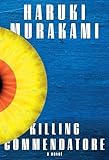 Killing Commendatore by Haruki Murakami (translated by Philip Gabriel and Ted Goossen): Like many before me, I once fell into Murakami’s fictional world only to emerge six months later wondering what on earth happened. So any anticipation for his new books is tempered by caution. His new novel is about a freshly divorced painter who moves to the mountains, where he finds an eerie and powerful painting called “Killing Commendatore.” Mysteries proliferate, and you will keep reading—not because you are expecting resolution but because it’s Murakami, and you’re under his spell. (Hannah)
Killing Commendatore by Haruki Murakami (translated by Philip Gabriel and Ted Goossen): Like many before me, I once fell into Murakami’s fictional world only to emerge six months later wondering what on earth happened. So any anticipation for his new books is tempered by caution. His new novel is about a freshly divorced painter who moves to the mountains, where he finds an eerie and powerful painting called “Killing Commendatore.” Mysteries proliferate, and you will keep reading—not because you are expecting resolution but because it’s Murakami, and you’re under his spell. (Hannah)
 All You Can Ever Know by Nicole Chung: This book—the first by the former editor of the much-missed site The Toast—is garnering high praise from lots of great people, among them Alexander Chee, who wrote, “I’ve been waiting for this writer, and this book—and everything else she’ll write.” Born prematurely to Korean parents who had immigrated to America, the author was adopted by a white couple who raised her in rural Oregon, where she encountered bigotry her family couldn’t see. Chung grew curious about her past, which led her to seek out the truth of her origins and identity. (Thom)
All You Can Ever Know by Nicole Chung: This book—the first by the former editor of the much-missed site The Toast—is garnering high praise from lots of great people, among them Alexander Chee, who wrote, “I’ve been waiting for this writer, and this book—and everything else she’ll write.” Born prematurely to Korean parents who had immigrated to America, the author was adopted by a white couple who raised her in rural Oregon, where she encountered bigotry her family couldn’t see. Chung grew curious about her past, which led her to seek out the truth of her origins and identity. (Thom)
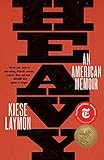 Heavy by Kiese Laymon: Finally! This memoir has been mentioned as “forthcoming” at the end of every Kiese Laymon interview or magazine article for a few years, and I’ve been excited about it the entire time. Laymon has written one novel and one essay collection about America and race. This memoir focuses on Laymon’s own body—in the personal sense of how he treats it and lives in it, and in the larger sense of the heavy burden of a black body in America. (Janet)
Heavy by Kiese Laymon: Finally! This memoir has been mentioned as “forthcoming” at the end of every Kiese Laymon interview or magazine article for a few years, and I’ve been excited about it the entire time. Laymon has written one novel and one essay collection about America and race. This memoir focuses on Laymon’s own body—in the personal sense of how he treats it and lives in it, and in the larger sense of the heavy burden of a black body in America. (Janet)
 Good and Mad: The Revolutionary Power of Women’s Anger by Rebecca Traister: What it says in the title, by one of the foremost contemporary chroniclers of the role(s) of women in American society. It feels as though the timing of this release could not be better (that is to say, worse). Read an interview with Traister here. (Lydia)
Good and Mad: The Revolutionary Power of Women’s Anger by Rebecca Traister: What it says in the title, by one of the foremost contemporary chroniclers of the role(s) of women in American society. It feels as though the timing of this release could not be better (that is to say, worse). Read an interview with Traister here. (Lydia)
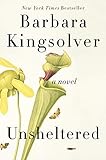 Unsheltered by Barbara Kingsolver: The beloved novelist’s latest tells the story of Willa Knox, whose middle-class life has crumbled: The magazine she built her career around has folded, and the college where her husband had tenure has shut down. All she has is a very old house in need of serious repair. Out of desperation, she begins looking into her house’s history, hoping that she might be able to get some funding from the historical society. Through her research, she finds a kindred spirit in Thatcher Greenwood, who occupied the premises in 1871 and was an advocate of the work of Charles Darwin. Though they are separated by more than a century, Knox and Greenwood both know what it’s like to live through cultural upheaval. (Hannah)
Unsheltered by Barbara Kingsolver: The beloved novelist’s latest tells the story of Willa Knox, whose middle-class life has crumbled: The magazine she built her career around has folded, and the college where her husband had tenure has shut down. All she has is a very old house in need of serious repair. Out of desperation, she begins looking into her house’s history, hoping that she might be able to get some funding from the historical society. Through her research, she finds a kindred spirit in Thatcher Greenwood, who occupied the premises in 1871 and was an advocate of the work of Charles Darwin. Though they are separated by more than a century, Knox and Greenwood both know what it’s like to live through cultural upheaval. (Hannah)
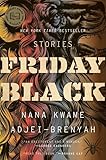 Friday Black by Nana Kwame Adjei-Brenyah: In his debut short story collection, that garnered him the National Book Foundation’s “5 under 35” honor, Adjei-Brenyah writes about the injustice black people face every day in America. Tackling issues like criminal justice, consumerism, and racism, these timely stories are searching for humanity in a brutal world. The collection is both heartbreaking and hopeful, and George Saunders called it “an excitement and a wonder: strange, crazed, urgent and funny.” (Carolyn)
Friday Black by Nana Kwame Adjei-Brenyah: In his debut short story collection, that garnered him the National Book Foundation’s “5 under 35” honor, Adjei-Brenyah writes about the injustice black people face every day in America. Tackling issues like criminal justice, consumerism, and racism, these timely stories are searching for humanity in a brutal world. The collection is both heartbreaking and hopeful, and George Saunders called it “an excitement and a wonder: strange, crazed, urgent and funny.” (Carolyn)
 Things to Make and Break by May-Lan Tan: This debut collection of short fiction is the most recent collaboration between Coffee House Press and Emily Books. The 11 short stories argue that relationships between two people often contain a third presence, whether that means another person or a past or future self. Tan’s sensibility has been compared to that of Joy Williams, David Lynch, and Carmen Maria Machado. (Hannah)
Things to Make and Break by May-Lan Tan: This debut collection of short fiction is the most recent collaboration between Coffee House Press and Emily Books. The 11 short stories argue that relationships between two people often contain a third presence, whether that means another person or a past or future self. Tan’s sensibility has been compared to that of Joy Williams, David Lynch, and Carmen Maria Machado. (Hannah)
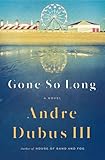 Gone So Long by Andre Dubus III: Whether in his fiction (House of Sand and Fog) or his nonfiction (Townie), Dubus tells blistering stories about broken lives. In his new novel, Daniel Ahern “hasn’t seen his daughter in forty years, and there is so much to tell her, but why would she listen?” Susan, his daughter, has good reason to hate Daniel—his horrific act of violence ruined their family and poisoned her life. Dubus has the preternatural power to make every storyline feel mythic, and Gone So Long rides an inevitable charge of guilt, fear, and stubborn hope. “Even after we’re gone, what we’ve left behind lives on in some way,” Dubus writes—including who we’ve left behind. (Nick R.)
Gone So Long by Andre Dubus III: Whether in his fiction (House of Sand and Fog) or his nonfiction (Townie), Dubus tells blistering stories about broken lives. In his new novel, Daniel Ahern “hasn’t seen his daughter in forty years, and there is so much to tell her, but why would she listen?” Susan, his daughter, has good reason to hate Daniel—his horrific act of violence ruined their family and poisoned her life. Dubus has the preternatural power to make every storyline feel mythic, and Gone So Long rides an inevitable charge of guilt, fear, and stubborn hope. “Even after we’re gone, what we’ve left behind lives on in some way,” Dubus writes—including who we’ve left behind. (Nick R.)
 Little by Edward Carey: Set in a Revolutionary Paris, a tiny, strange-looking girl named Marie is born—and then orphaned. Carey blurs the lines between fact and fiction, and art and reality, in his fictionalized tale of the little girl who grew up to become Madame Tussaud. In a starred review, Publishers Weekly writes the novel’s “sumptuous turns of phrase, fashions a fantastical world that churns with vitality.” (Carolyn)
Little by Edward Carey: Set in a Revolutionary Paris, a tiny, strange-looking girl named Marie is born—and then orphaned. Carey blurs the lines between fact and fiction, and art and reality, in his fictionalized tale of the little girl who grew up to become Madame Tussaud. In a starred review, Publishers Weekly writes the novel’s “sumptuous turns of phrase, fashions a fantastical world that churns with vitality.” (Carolyn)
 White Dancing Elephants by Chaya Bhuvaneswar: Drawing comparisons to Gabriel Garcia Marquez, Margaret Atwood, and Sandra Cisneros, Bhuvaneswar’s debut collection pulls together stories of diverse women of color as they face violence, whether it be sexual, racial, or self-inflicted. The Buddha also makes an appearance, as do Hindu myths, incurable diseases, and an android. No wonder Jeff VanderMeer calls White Dancing Elephants “often provocative” as well as bold, honest, and fresh. (Kaulie)
White Dancing Elephants by Chaya Bhuvaneswar: Drawing comparisons to Gabriel Garcia Marquez, Margaret Atwood, and Sandra Cisneros, Bhuvaneswar’s debut collection pulls together stories of diverse women of color as they face violence, whether it be sexual, racial, or self-inflicted. The Buddha also makes an appearance, as do Hindu myths, incurable diseases, and an android. No wonder Jeff VanderMeer calls White Dancing Elephants “often provocative” as well as bold, honest, and fresh. (Kaulie)
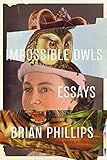 Impossible Owls by Brian Phillips: You know meritocratic capitalism is a lie because everyone who wrote during Holly Anderson’s tenure as editor of MTV News is not presently wealthy beyond imagination, but that’s beside the point. Better yet, let’s pour one out for Grantland. Better still, let’s focus on one truth. Brian Phillips’s essays are out of this world: big-hearted, exhaustive, unrelentingly curious, and goddamned fun. It’s about time he graced us with this collection. (Nick M.)
Impossible Owls by Brian Phillips: You know meritocratic capitalism is a lie because everyone who wrote during Holly Anderson’s tenure as editor of MTV News is not presently wealthy beyond imagination, but that’s beside the point. Better yet, let’s pour one out for Grantland. Better still, let’s focus on one truth. Brian Phillips’s essays are out of this world: big-hearted, exhaustive, unrelentingly curious, and goddamned fun. It’s about time he graced us with this collection. (Nick M.)
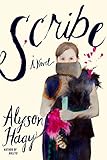 Scribe by Alyson Hagy: In a world devastated by a civil war and fevers, an unnamed protagonist uses her gift of writing to protect herself and her family’s old Appalachian farmhouse. When Hendricks, a mysterious man with a dark past, asks for a letter, the pair set off an unforeseen chain of events. Steeped in folklore and the supernatural, Kirkus‘s starred review called it “a deft novel about the consequences and resilience of storytelling.” (Carolyn)
Scribe by Alyson Hagy: In a world devastated by a civil war and fevers, an unnamed protagonist uses her gift of writing to protect herself and her family’s old Appalachian farmhouse. When Hendricks, a mysterious man with a dark past, asks for a letter, the pair set off an unforeseen chain of events. Steeped in folklore and the supernatural, Kirkus‘s starred review called it “a deft novel about the consequences and resilience of storytelling.” (Carolyn)
The Witch Elm by Tana French: For six novels now, French has taken readers inside the squabbling, backstabbing world of the (fictional) Dublin Murder Squad, with each successive book following a different detective working frantically to close a case. Now, in a twist, French has—temporarily, we hope—set aside the Murder Squad for a stand-alone book that follows the victim of a crime, a tall, handsome, faintly clueless public relations man named Toby who is nearly beaten to death when he surprises two burglars in his home. Early reviews online attest that French’s trademark immersive prose and incisive understanding of human psychology remain intact, but readers do seem to miss the Murder Squad. (Michael)
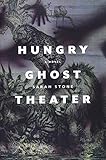 Hungry Ghost Theater by Sarah Stone: Siblings Robert and Julia Zamarin want to reveal the dangers of the world with their small political theater company while their neuroscientist sister Eva attempts to find the biological roots of empathy. While contending with fraught family dynamics, the novel touches on themes like art, free will, addiction, desire, and loss. Joan Silber writes she “found this an unforgettable book, astute, vivid, and stubbornly ambitious in its scope.” (Carolyn)
Hungry Ghost Theater by Sarah Stone: Siblings Robert and Julia Zamarin want to reveal the dangers of the world with their small political theater company while their neuroscientist sister Eva attempts to find the biological roots of empathy. While contending with fraught family dynamics, the novel touches on themes like art, free will, addiction, desire, and loss. Joan Silber writes she “found this an unforgettable book, astute, vivid, and stubbornly ambitious in its scope.” (Carolyn)
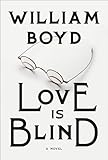 Love is Blind by William Boyd: In Boyd’s 15th novel, Brodie Moncur—a piano tuner with perfect pitch—flees his oppressive family in Scotland and travels across Europe. In the shadow of a (seemingly) doomed affair, the novel ruminates on the devastating power of passion, secrets, and deception. (Carolyn)
Love is Blind by William Boyd: In Boyd’s 15th novel, Brodie Moncur—a piano tuner with perfect pitch—flees his oppressive family in Scotland and travels across Europe. In the shadow of a (seemingly) doomed affair, the novel ruminates on the devastating power of passion, secrets, and deception. (Carolyn)
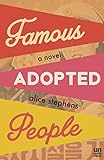 Famous Adopted People by Alice Stephens: Stephens’ debut novel follows Lisa, a 27-year-old adoptee, as she travels to South Korea to find her birth mother. Equally tense, tragic, and comedic, Publishers Weekly describes the novel as a “fun-house depiction of the absurdities and horrors of the surveillance state.” (Carolyn)
Famous Adopted People by Alice Stephens: Stephens’ debut novel follows Lisa, a 27-year-old adoptee, as she travels to South Korea to find her birth mother. Equally tense, tragic, and comedic, Publishers Weekly describes the novel as a “fun-house depiction of the absurdities and horrors of the surveillance state.” (Carolyn)
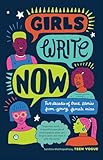 Girls Write Now by Girls Write Now: Containing more than one hundred essays from young women in the Girls Write Now program, a writing and mentorship program in New York City. The anthology contains stories rife with angst, uncertainty, grief, hope, honesty, and joy, and advice on writing and life from powerhouses like Roxane Gay, Chimamanda Ngozi Adichie, and Zadie Smith. Kirkus calls the anthology “an inspiring example of honest writing.” (Carolyn)
Girls Write Now by Girls Write Now: Containing more than one hundred essays from young women in the Girls Write Now program, a writing and mentorship program in New York City. The anthology contains stories rife with angst, uncertainty, grief, hope, honesty, and joy, and advice on writing and life from powerhouses like Roxane Gay, Chimamanda Ngozi Adichie, and Zadie Smith. Kirkus calls the anthology “an inspiring example of honest writing.” (Carolyn)
 A Dream Called Home by Reyna Grande: A former undocumented Mexican immigrant, Grande’s memoir explores to her journey from poverty to successful author—and the first of her family to graduate from college. Candid and heartfelt in exploring the difficulties of immigration and assimilation, Publishers Weekly‘s starred review called the book an “uplifting story of fortitude and resilience.” (Carolyn)
A Dream Called Home by Reyna Grande: A former undocumented Mexican immigrant, Grande’s memoir explores to her journey from poverty to successful author—and the first of her family to graduate from college. Candid and heartfelt in exploring the difficulties of immigration and assimilation, Publishers Weekly‘s starred review called the book an “uplifting story of fortitude and resilience.” (Carolyn)
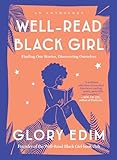 Well-Read Black Girl ed. Glory Edim: Glory Edim founded Well-Read Black Girl, a Brooklyn-based book club and an online space that highlights black literature and sisterhood, and last year she produced the inaugural Well-Read Black Girl Festival. Most recently, Edim curated the Well-Read Black Girl anthology, and contributors include Morgan Jerkins, Tayari Jones, Lynn Nottage, Gabourey Sidibe, Rebecca Walker, Jesmyn Ward, Jacqueline Woodson, and Barbara Smith. The collection of essays celebrates the power of representation, visibility, and storytelling. (Zoë)
Well-Read Black Girl ed. Glory Edim: Glory Edim founded Well-Read Black Girl, a Brooklyn-based book club and an online space that highlights black literature and sisterhood, and last year she produced the inaugural Well-Read Black Girl Festival. Most recently, Edim curated the Well-Read Black Girl anthology, and contributors include Morgan Jerkins, Tayari Jones, Lynn Nottage, Gabourey Sidibe, Rebecca Walker, Jesmyn Ward, Jacqueline Woodson, and Barbara Smith. The collection of essays celebrates the power of representation, visibility, and storytelling. (Zoë)
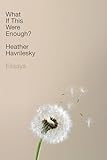 What If This Were Enough? by Heather Havrilesky: Havrilesky’s, the acclaimed memoirist and columnist for The Cut‘s “Ask Polly” advice column, newest collection addresses our culture’s obsession with self-improvement. Publishers Weekly‘s starred review writes “it’s a message she relates with insight, wit, and terrific prose.” Tackling subjects like materialism, romance, and social media, she asks readers—who are constantly inundated with messages about productivity and betterment—to ask less of themselves, to realize that they (and their lives) are enough. (Carolyn)
What If This Were Enough? by Heather Havrilesky: Havrilesky’s, the acclaimed memoirist and columnist for The Cut‘s “Ask Polly” advice column, newest collection addresses our culture’s obsession with self-improvement. Publishers Weekly‘s starred review writes “it’s a message she relates with insight, wit, and terrific prose.” Tackling subjects like materialism, romance, and social media, she asks readers—who are constantly inundated with messages about productivity and betterment—to ask less of themselves, to realize that they (and their lives) are enough. (Carolyn)









